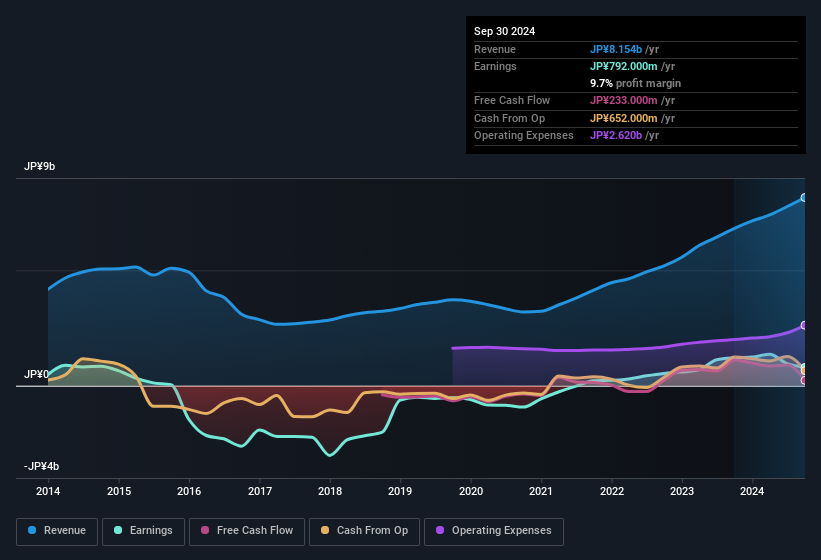- Japan
- /
- Wireless Telecom
- /
- TSE:9424
Weak Statutory Earnings May Not Tell The Whole Story For Japan Communications (TSE:9424)
The market rallied behind Japan Communications Inc.'s (TSE:9424) stock, leading do a rise in the share price after its recent weak earnings report. While shareholders may be willing to overlook soft profit numbers, we believe that they should also be taking into account some other factors which may be cause for concern.
Check out our latest analysis for Japan Communications

Examining Cashflow Against Japan Communications' Earnings
In high finance, the key ratio used to measure how well a company converts reported profits into free cash flow (FCF) is the accrual ratio (from cashflow). To get the accrual ratio we first subtract FCF from profit for a period, and then divide that number by the average operating assets for the period. The ratio shows us how much a company's profit exceeds its FCF.
Therefore, it's actually considered a good thing when a company has a negative accrual ratio, but a bad thing if its accrual ratio is positive. While having an accrual ratio above zero is of little concern, we do think it's worth noting when a company has a relatively high accrual ratio. That's because some academic studies have suggested that high accruals ratios tend to lead to lower profit or less profit growth.
Japan Communications has an accrual ratio of 0.86 for the year to September 2024. Ergo, its free cash flow is significantly weaker than its profit. Statistically speaking, that's a real negative for future earnings. To wit, it produced free cash flow of JP¥233m during the period, falling well short of its reported profit of JP¥792.0m. Japan Communications shareholders will no doubt be hoping that its free cash flow bounces back next year, since it was down over the last twelve months.
Note: we always recommend investors check balance sheet strength. Click here to be taken to our balance sheet analysis of Japan Communications.
Our Take On Japan Communications' Profit Performance
As we discussed above, we think Japan Communications' earnings were not supported by free cash flow, which might concern some investors. For this reason, we think that Japan Communications' statutory profits may be a bad guide to its underlying earnings power, and might give investors an overly positive impression of the company. But the good news is that its EPS growth over the last three years has been very impressive. The goal of this article has been to assess how well we can rely on the statutory earnings to reflect the company's potential, but there is plenty more to consider. So while earnings quality is important, it's equally important to consider the risks facing Japan Communications at this point in time. Case in point: We've spotted 2 warning signs for Japan Communications you should be mindful of and 1 of them is significant.
Today we've zoomed in on a single data point to better understand the nature of Japan Communications' profit. But there are plenty of other ways to inform your opinion of a company. Some people consider a high return on equity to be a good sign of a quality business. While it might take a little research on your behalf, you may find this free collection of companies boasting high return on equity, or this list of stocks with significant insider holdings to be useful.
New: Manage All Your Stock Portfolios in One Place
We've created the ultimate portfolio companion for stock investors, and it's free.
• Connect an unlimited number of Portfolios and see your total in one currency
• Be alerted to new Warning Signs or Risks via email or mobile
• Track the Fair Value of your stocks
Have feedback on this article? Concerned about the content? Get in touch with us directly. Alternatively, email editorial-team (at) simplywallst.com.
This article by Simply Wall St is general in nature. We provide commentary based on historical data and analyst forecasts only using an unbiased methodology and our articles are not intended to be financial advice. It does not constitute a recommendation to buy or sell any stock, and does not take account of your objectives, or your financial situation. We aim to bring you long-term focused analysis driven by fundamental data. Note that our analysis may not factor in the latest price-sensitive company announcements or qualitative material. Simply Wall St has no position in any stocks mentioned.
About TSE:9424
Japan Communications
A mobile virtual network operator (MVNO), provides mobile services in Japan, the United States, and internationally.
Excellent balance sheet with proven track record.
Similar Companies
Market Insights
Weekly Picks

Solutions by stc: 34% Upside in Saudi's Digital Transformation Leader


The AI Infrastructure Giant Grows Into Its Valuation
Recently Updated Narratives

Perdana Petroleum Berhad is a Zombie Business with a 27.34% Profit Margin and inflation adjusted revenue Business
Many trends acting at the same time


Engineered for Stability. Positioned for Growth.
Popular Narratives


MicroVision will explode future revenue by 380.37% with a vision towards success


NVDA: Expanding AI Demand Will Drive Major Data Center Investments Through 2026



